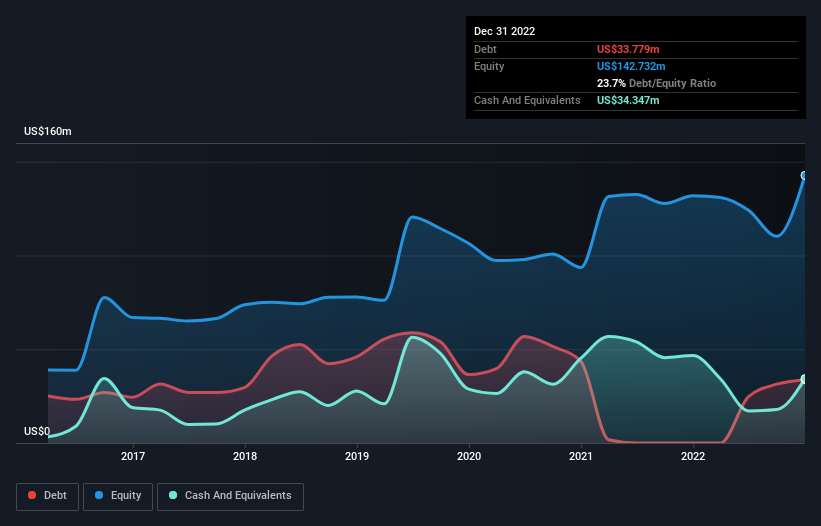David Iben put it well when he said, 'Volatility is not a risk we care about. What we care about is avoiding the permanent loss of capital.' When we think about how risky a company is, we always like to look at its use of debt, since debt overload can lead to ruin. Importantly, DZS Inc. (NASDAQ:DZSI) does carry debt. But the real question is whether this debt is making the company risky.
Why Does Debt Bring Risk?
Debt assists a business until the business has trouble paying it off, either with new capital or with free cash flow. Part and parcel of capitalism is the process of 'creative destruction' where failed businesses are mercilessly liquidated by their bankers. While that is not too common, we often do see indebted companies permanently diluting shareholders because lenders force them to raise capital at a distressed price. By replacing dilution, though, debt can be an extremely good tool for businesses that need capital to invest in growth at high rates of return. The first step when considering a company's debt levels is to consider its cash and debt together.
Check out our latest analysis for DZS
What Is DZS's Net Debt?
The image below, which you can click on for greater detail, shows that at December 2022 DZS had debt of US$33.8m, up from none in one year. But on the other hand it also has US$34.3m in cash, leading to a US$568.0k net cash position.

How Strong Is DZS' Balance Sheet?
The latest balance sheet data shows that DZS had liabilities of US$209.2m due within a year, and liabilities of US$33.1m falling due after that. Offsetting this, it had US$34.3m in cash and US$170.5m in receivables that were due within 12 months. So its liabilities total US$37.4m more than the combination of its cash and short-term receivables.
Since publicly traded DZS shares are worth a total of US$251.5m, it seems unlikely that this level of liabilities would be a major threat. However, we do think it is worth keeping an eye on its balance sheet strength, as it may change over time. Despite its noteworthy liabilities, DZS boasts net cash, so it's fair to say it does not have a heavy debt load! There's no doubt that we learn most about debt from the balance sheet. But it is future earnings, more than anything, that will determine DZS's ability to maintain a healthy balance sheet going forward. So if you're focused on the future you can check out this free report showing analyst profit forecasts.
Over 12 months, DZS reported revenue of US$376m, which is a gain of 7.3%, although it did not report any earnings before interest and tax. We usually like to see faster growth from unprofitable companies, but each to their own.
So How Risky Is DZS?
We have no doubt that loss making companies are, in general, riskier than profitable ones. And we do note that DZS had an earnings before interest and tax (EBIT) loss, over the last year. And over the same period it saw negative free cash outflow of US$55m and booked a US$37m accounting loss. Given it only has net cash of US$568.0k, the company may need to raise more capital if it doesn't reach break-even soon. Overall, we'd say the stock is a bit risky, and we're usually very cautious until we see positive free cash flow. When analysing debt levels, the balance sheet is the obvious place to start. But ultimately, every company can contain risks that exist outside of the balance sheet. For instance, we've identified 2 warning signs for DZS that you should be aware of.
At the end of the day, it's often better to focus on companies that are free from net debt. You can access our special list of such companies (all with a track record of profit growth). It's free.
New: Manage All Your Stock Portfolios in One Place
We've created the ultimate portfolio companion for stock investors, and it's free.
• Connect an unlimited number of Portfolios and see your total in one currency
• Be alerted to new Warning Signs or Risks via email or mobile
• Track the Fair Value of your stocks
Have feedback on this article? Concerned about the content? Get in touch with us directly. Alternatively, email editorial-team (at) simplywallst.com.
This article by Simply Wall St is general in nature. We provide commentary based on historical data and analyst forecasts only using an unbiased methodology and our articles are not intended to be financial advice. It does not constitute a recommendation to buy or sell any stock, and does not take account of your objectives, or your financial situation. We aim to bring you long-term focused analysis driven by fundamental data. Note that our analysis may not factor in the latest price-sensitive company announcements or qualitative material. Simply Wall St has no position in any stocks mentioned.
About OTCPK:DZSI
DZS
Provides access and optical networking infrastructure, and cloud software solutions in the Americas, Europe, the Middle East, Africa, and Asia.
Slight with mediocre balance sheet.
Similar Companies
Market Insights
Community Narratives



